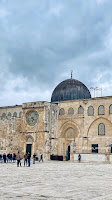Al-Aqsa Mosque
The Al-Aqsa Mosque, located in the Old City of Jerusalem, is one of the holiest sites in Islam. It's the third holiest mosque after the Kaaba in Mecca and the Prophet's Mosque in Medina. Muslims believe it to be the place where the Prophet Muhammad ascended to heaven during the Night Journey. The mosque complex also includes the Dome of the Rock, an iconic structure with a gold dome, built over the Foundation Stone, which is significant in both Islam and Judaism. The site holds immense religious and historical significance, leading to it being a focal point of tensions and conflicts in the region.Certainly! Here are some additional details about the Al-Aqsa Mosque:
1. **History**: The mosque has a rich history dating back to the early Islamic period. It was originally built in the 7th century but has undergone numerous renovations and expansions over the centuries.
2. **Architecture**: The current structure of the mosque reflects various architectural styles due to the renovations it has undergone. It features elements of Islamic, Byzantine, and Crusader architecture.
3. **Importance**: Besides its religious significance to Muslims, the Al-Aqsa Mosque is also important to Palestinians as a symbol of their national identity and aspirations. It is a focal point for Palestinian protests and has been at the center of conflicts between Palestinians and Israelis.
4. **Access**: Access to the mosque can be restricted at times due to political tensions in the region. Both Muslims and non-Muslims can visit, but there are often restrictions imposed by Israeli authorities, particularly during times of heightened tensions.
5. **Cultural Center**: In addition to being a place of worship, the Al-Aqsa Mosque complex serves as a cultural center, hosting educational programs, religious lectures, and community events.
6. **Controversies**: The status of Jerusalem, including the Al-Aqsa Mosque, is a highly contentious issue in the Israeli-Palestinian conflict. Disputes over control and access to the site have led to violence and diplomatic tensions between Israel and the Muslim world.
Overall, the Al-Aqsa Mosque is not only a religious site but also a symbol of the complex political and cultural dynamics Certainly, here are a few additional points of importance regarding the Al-Aqsa Mosque:
1. **Jerusalem**: The mosque is situated within the Old City of Jerusalem, which is significant not only to Muslims but also to Jews and Christians. Jerusalem's status as a holy city for three major religions adds to the complexity of the issues surrounding the Al-Aqsa Mosque.
2. **Waqf**: The management and maintenance of the Al-Aqsa Mosque complex fall under the jurisdiction of the Islamic Waqf, an Islamic trust responsible for overseeing Muslim religious sites in Jerusalem. The Waqf plays a crucial role in administering the affairs of the mosque and preserving its sanctity.
3. **Archeological Importance**: The Al-Aqsa Mosque compound is built on the Temple Mount, which is believed to be the site of the ancient Jewish temples, including Solomon's Temple. As a result, the area holds significant archaeological importance, adding layers to its historical and religious significance.
4. **Visitation**: While the mosque primarily serves as a place of worship for Muslims, non-Muslim visitors are also permitted to visit the compound under certain conditions. However, access for non-Muslims is often restricted during sensitive times or religious holidays to prevent tensions and maintain security.
5. **Symbolism**: Beyond its religious significance, the Al-Aqsa Mosque symbolizes the Palestinian struggle for self-determination and sovereignty. It has become a potent symbol of resistance against occupation and a focal point for Palestinian national identity.
Understanding these aspects provides a broader context for appreciating the significance of the Al-Aqsa Mosque in the larger geopolitical landscape of the Middle East and its impact on regionAs of my last update in January 2022, the situation regarding the Al-Aqsa Mosque and the broader Israeli-Palestinian conflict is subject to change due to the fluid nature of the region's political dynamics. However, some ongoing trends and key points include:
1. **Tensions and Conflicts**: The Al-Aqsa Mosque complex has historically been a flashpoint for tensions and violence between Palestinians and Israeli security forces. Clashes often erupt during times of heightened political tensions, religious holidays, or provocative actions by either side.
2. **Access Restrictions**: Israeli authorities periodically impose restrictions on access to the Al-Aqsa Mosque compound, particularly for Muslims from the West Bank and Gaza Strip. These restrictions are often criticized by Palestinians and the international community.
3. **Settlement Expansion**: The Israeli government's policy of settlement expansion in East Jerusalem, including areas surrounding the Old City where the Al-Aqsa Mosque is located, remains a source of contention. Palestinians view this as a violation of international law and an impediment to the viability of a future Palestinian state.
4. **International Concerns**: The status of Jerusalem, including the Al-Aqsa Mosque, is a matter of international concern and has implications for regional stability. The issue is frequently raised in international forums and has led to diplomatic tensions between Israel and various countries, particularly those in the Arab and Muslim world.
5. **Peace Efforts**: Efforts to resolve the Israeli-Palestinian conflict and address the status of Jerusalem, including proposals for a two-state solution, have faced numerous challenges. The lack of progress in peace negotiations contributes to ongoing tensions and sporadic outbreaks of violence.
Overall, the situation surrounding the Al-Aqsa Mosque remains volatile and is influenced by broader political, religious, and social dynamics in the region. It underscores the complexity of the Israeli-Palestinian conflict and the challenges involved in achieving a lasting resolution. For the most current updates, it's essential to refer to recent news sources and developments.al dynamics.in the region.



